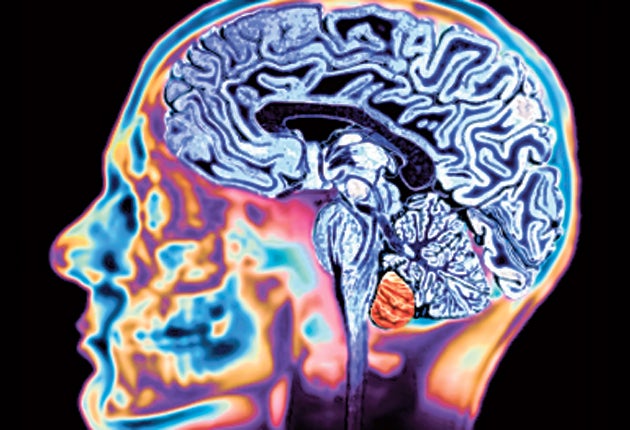Scientists identify brain's region for introspection

Scientists have identified the part of the brain that appears to control introspection – the ability to think about what you are thinking.
The discovery could lead to an understanding of one of the key ingredients of human consciousness and could help to treat certain brain injuries where people lose their ability to reflect upon their own thoughts and actions.
Researchers found that people who were more introspective tended to have larger volumes of nerve tissue in an area of the prefrontal cortex, directly behind the eyes.
"We found a correlation between introspective ability and the structure of a small area of prefrontal cortex near the front of the brain," said Professor Geraint Rees of University College London. "The better a person was at introspection, the more grey matter they had in this area. The same was true of the white matter, or nerve connections, in this area," he said.
"At this stage, we don't know why their grey or white matter differs in this small area. Does this area develop as we get better at reflecting our thoughts, or are people better at introspection if their prefrontal cortex is more developed in the first place?" Professor Rees added.
The discovery follows analyses of the brain scans of 32 volunteers who were asked to complete a psychological test based on a computer screen designed to examine their ability to think about their own actions.
"We made this task difficult so that people could never be entirely sure about whether their answer was correct," said Rimona Weil, a UCL researcher who took part in the study, published in the journal Science. "Someone who is good at introspection will be confident when they know they are correct, because they have seen it clearly. But they will be less confident when they are not sure they are right or wrong," she said.
"It's like Who Wants to Be a Millionaire? A good contestant will go with their answer when they're sure, and phone a friend if unsure. But a poor contestant might not be as good at judging how likely they are to be correct," Dr Weil said.
Steve Fleming of UCL said studying introspection was difficult because there were no simple, outward signs that someone might be good or bad at it. We introspect when we think about our own thoughts, feelings or the decisions we have made. It's something we do all the time, but some people are better at it than others," Dr Fleming said.
"Even if we don't get feedback when we make a choice, we often know intuitively if it's a good or bad decision." Further research could lead to new forms of medical treatment for people suffering brain damage to this area, he added.
"Take the example of two patients with mental illness, one who is aware of their illness, and one who is not. The first person is likely to take their medication, the second less likely," he said. "If we understand self-awareness at the neurological level, then perhaps we can adapt treatments and develop training strategies for these patients."
He said introspection was a part of consciousness unique to the human brain. By gaining an insight into the nature of introspection, scientists may gain a better understanding of conscious thought.
Join our commenting forum
Join thought-provoking conversations, follow other Independent readers and see their replies
Comments
Bookmark popover
Removed from bookmarks